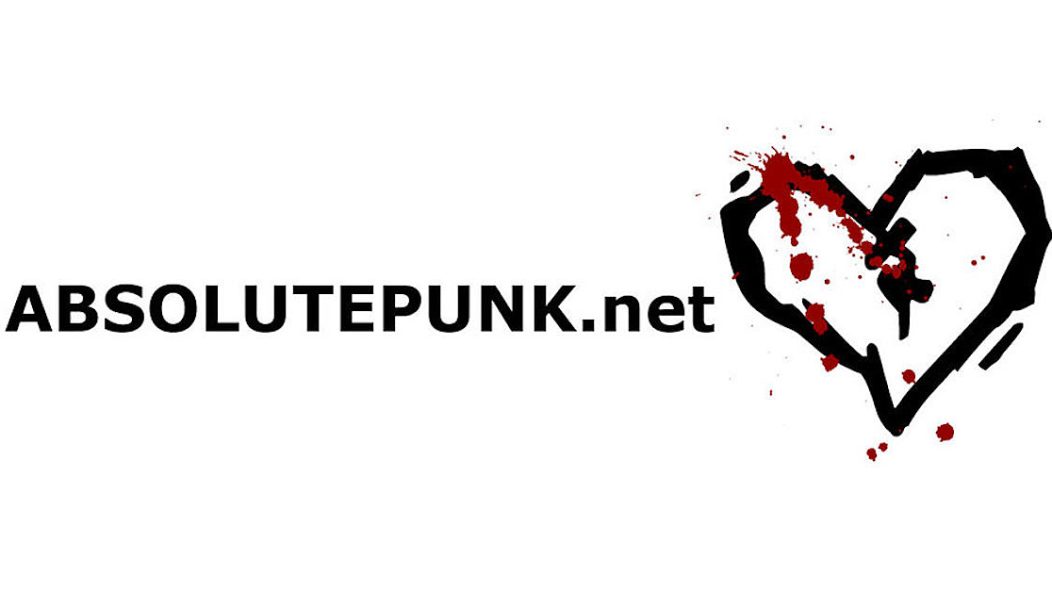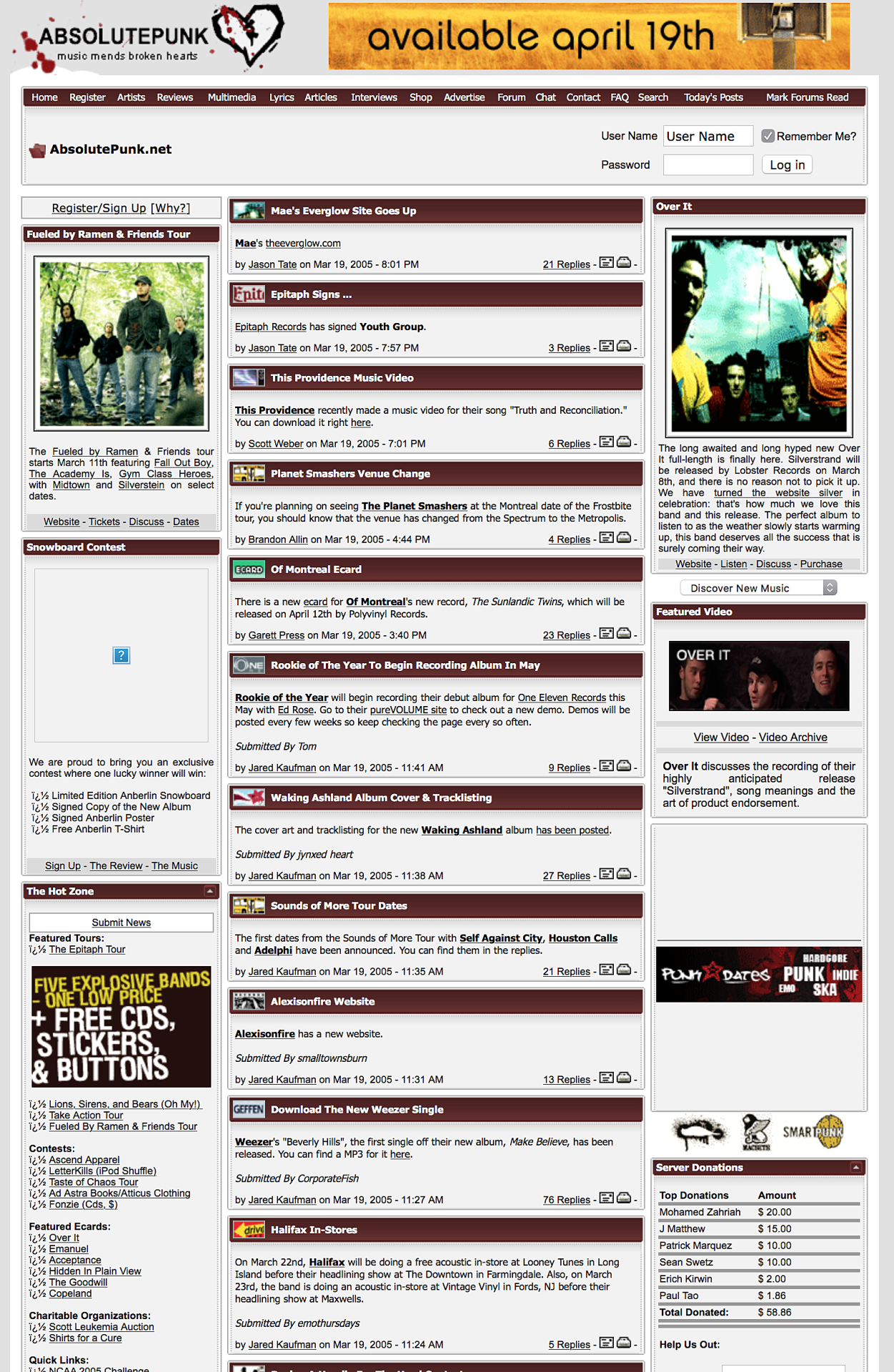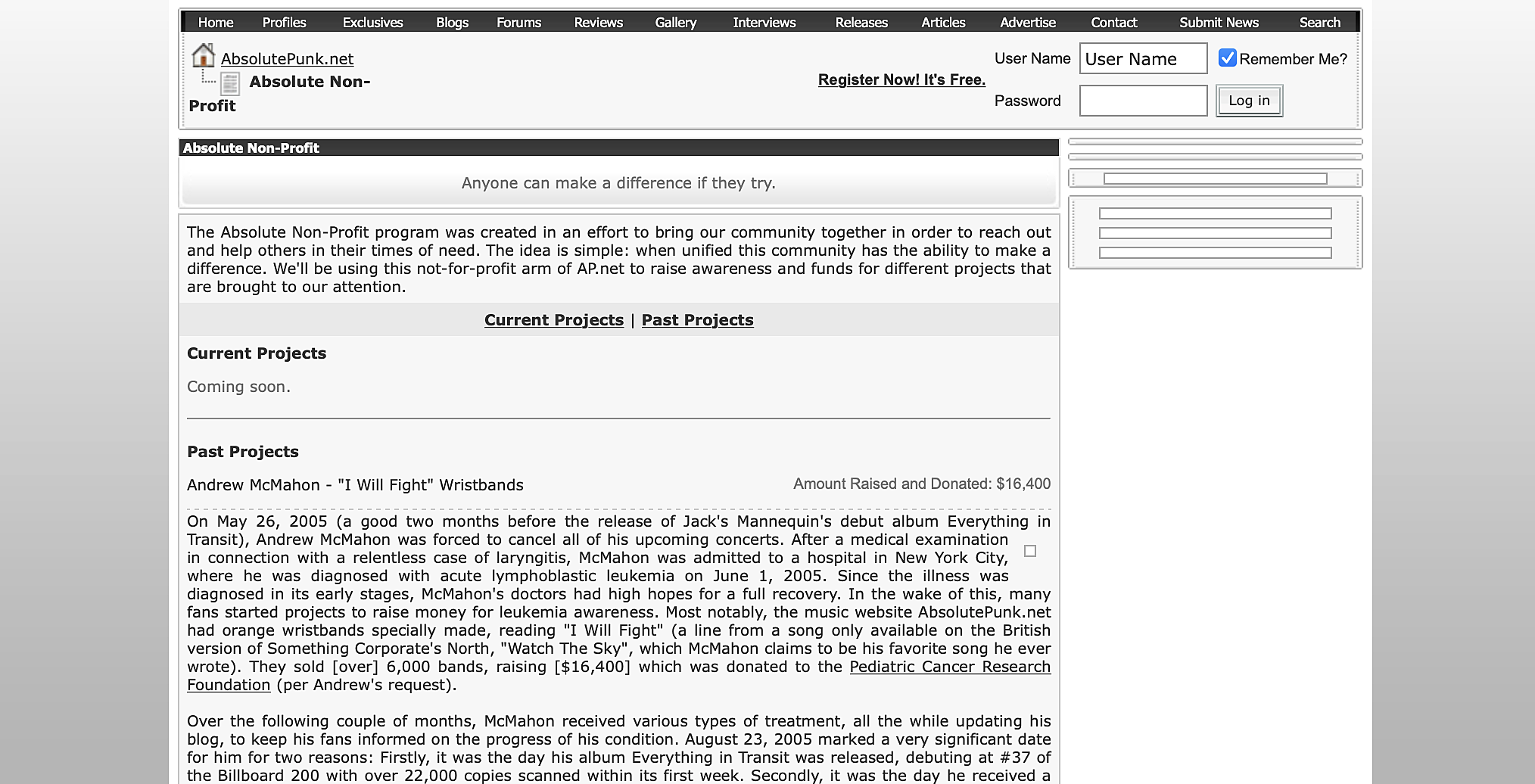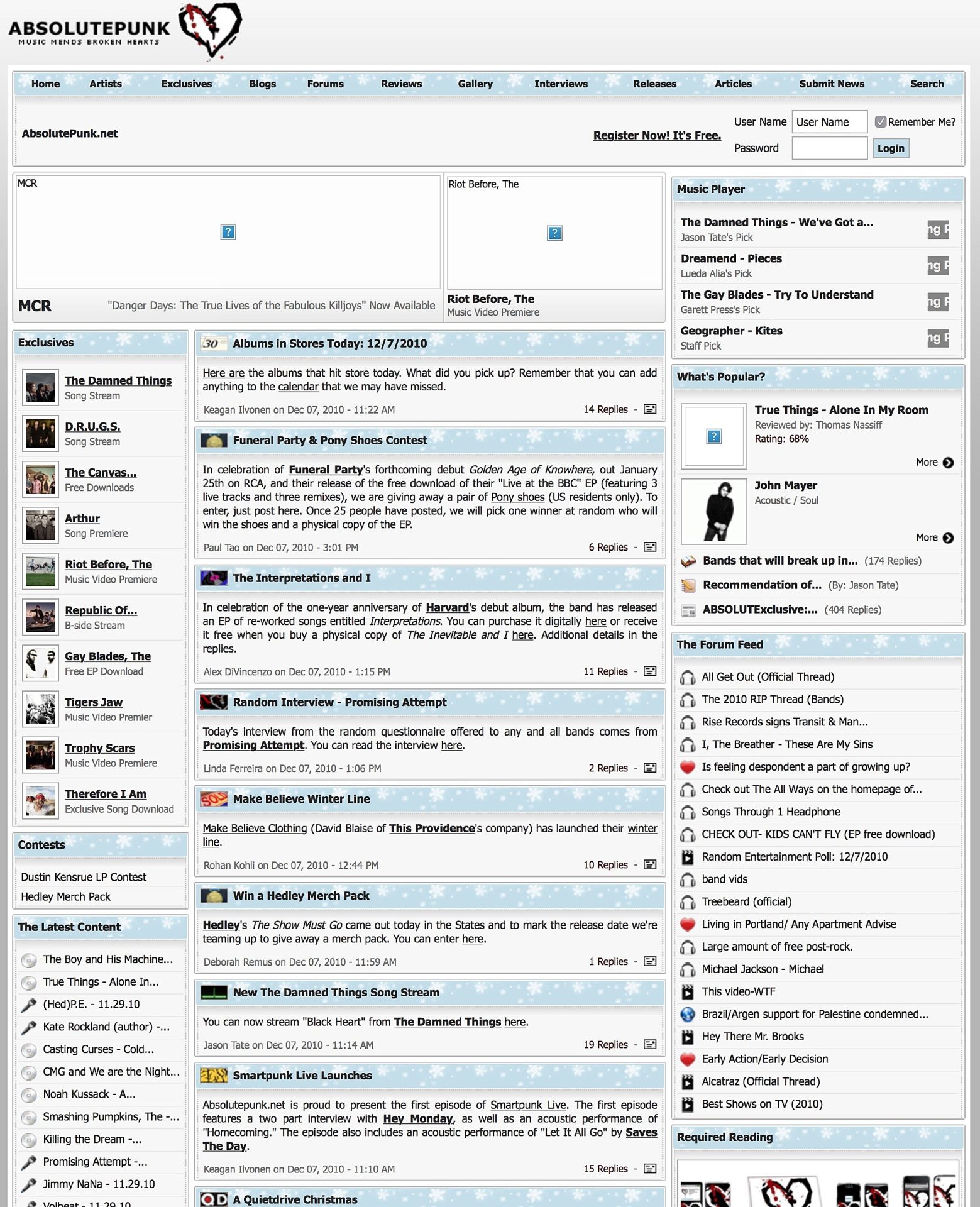
How AbsolutePunk.net helped emo fans find an online community from the early '00s-2010s
In the yesteryears of the internet, before the masses used Twitter to have bad-faith arguments with strangers from opposing stan clans, music fans congregated on genre-based forum boards and sites where they could find community and friendship.
A gem among the wave of vBulletin-driven sites was AbsolutePunk.net. Founded in 1998 and running for the best part of two decades, AbsolutePunk, with its slogan “music mends broken hearts,” was a one-stop-shop for punk and emo news, with users and writers from across the world.
To its users, the site was a home where obscure tastes were the norm. For bands from the growing emo and pop-punk scene, it was an opportunity for coverage, no matter how small your following was. As a journalist who had my first writing opportunity on AbsolutePunk at 17, it was a launchpad for the direction my life has taken ever since. From 2012 to 2016, AbsolutePunk was the place I learned how to write through my coverage of rising emo bands like Modern Baseball and Foxing, as well as more established pop-punk, hardcore, and indie acts.
Read more: Every Paramore album ranked
This entire ecosystem started from the Portland bedroom of a teenage boy with a dial-up connection and an early internet dream. When he was a teenager, the emerging internet allowed AbsolutePunk founder Jason Tate to find and fall in love with new music. “I started listening to bands like Blink-182 and MxPX and this new wave of punk music and found people online who shared that interest.” Before this, his relationship with music had been incidental, he listened to “Metallica, Nirvana and hair metal” because of his friends, but had never felt truly like he “considered this music [his] own.”
https://www.instagram.com/p/CZ0ms3TrHoT/
Tate built his corner of the internet from his home and began a fansite for posting about Blink-182 and MxPx in 1998. His new site earned its iconic name from a surprising place. “I needed a name for this stupid thing. Punk was apparent from the music I was writing about. Then, I saw an ad for AbsolutVodka and thought if I called it ‘AbsolutePunk’ it would rank high on search rankings because everything was alphabetical back then,” he laughs.
After manning AbsolutePunk as a fansite for a few years, Tate moved on to college where he had more time in his dorm room to sink into the project. At this point, he expanded the site’s scope and began covering rising pop-punk bands like Homegrown, Fenix TX, and New Found Glory — acts that Tate recognized would resonate with those already using the site for Blink-182 news.
Artists began to express interest in AbsolutePunk. “Increasingly, bands asked if I could write about their music. The scene I was covering started blowing up around 2002. As the profile of bands like Yellowcard, Fall Out Boy, and My Chemical Romance grew, so did the site. That was the beginning of AbsolutePunk being a real thing.”
From here, like-minded people joined Tate’s fledging team. “It all happened organically as I met people who loved this music and wanted to talk about it. People would send me their work and if it seemed like a good fit, I’d say, ‘Sure, let’s give it a go.’” Starting off with one staff writer, the site grew to average 20 staff members at any time, with 35 at its peak.

[Archival image of AbsolutePunk.net / Courtesy of Jason Tate]
One such writer who remained prominent through AbsolutePunk’s history and still writes to this day for Tate’s ongoing site, Chorus FM, is Drew Beringer. Beringer came upon the site during a high school English class. “I had heard that John Nolan and Shaun Cooper had left Taking Back Sunday and started a new band called Straylight Run. I looked up ‘Straylight Run demos’ and the first thing that came up was AbsolutePunk,” he explains.
In a story that reflects most of the writers involved, Beringer browsed the site for news over the next year and eventually signed up in 2005. Soon Beringer submitted a review of Emory’s The Question to Tate and subsequently became a staff writer. “I was probably one of the more prolific reviewers,” he explains.
Editorially, AbsolutePunk’s content comprised an endless cycle of news posts and reviews from all across the musical spectrum. Reviews were predominantly from staff writers, however, a User Reviews segment allowed anyone from the community to write, with some hand-holding from the User Reviews editor.
Despite writing for the site voluntarily in their spare time from work and college, the staff writers were wildly accomplished, creating a comprehensive database of scene coverage. “I ended up doing I think 200 reviews throughout my time there,” says Craig Manning, former Senior Editor.
Many of the staff writers found their own niches, such as writer Thomas Nassif, whose name was synonymous with pop-punk on the site. Providing coverage to new artists was what Nassif loved about the site. “I have great memories of being able to track a band’s career from the start. It was much more exciting to review Balance and Composure’s first album versus Linkin Park’s ninth,” Nassif says. “Many bands would have stopped performing without a review on the site. Often, our coverage led to other coverage, which led to big things for the acts.”
Andrew McMahon emphasizes AbsolutePunk’s role in covering artists that other media outlets largely ignored. The former frontman of Something Corporate and Jack’s Mannequin, two acts that were popular amongst the community, explains “when the traditional music press was not very interested in covering my bands and other bands from our scene, AbsolutePunk was always there carrying the torch.”

[Archival image of AbsolutePunk.net / Courtesy of Jason Tate]
One thing that set AbsolutePunk apart from many of its peers was its willingness to engage with new technology, often ahead of its time. Lueda Alia, who started as a moderator on the forums before becoming a prominent staff member, oversaw an early version of streaming. “I ran with the idea of music streaming. I convinced record labels, artists, and agencies to be okay with this new thing. We got to a point where every week we had at least four or five releases streaming,” Alia explains. “No one else was doing it. We broke the seal.” These streams ranged from small bands starting out to tremendous catches, like an exclusive of Fall Out Boy’s “America’s Suitehearts” in 2008.
Other initiatives included AMA-style forum discussions with artists who had profiles on the site. One such artist was Paramore, who had a visit that went down in AbsolutePunk history. “Paramore were meant to do a chat, but it never happened,” explains Joe Cubera, a long-term member of the site. Because of an unprecedented amount of users, the site crashed. In a move that embodied the close relationship between fans and artists that occurred throughout AbsolutePunk, Hayley Williams logged back in unannounced later that night.
“Everybody who was awake in the middle of the night just sat around chatting with Hayley Williams into the early hours of the morning,” Cubera says. “The frontwoman of one of the biggest bands in the world took time to come back and talk with a bunch of kids who loved her music.”
Any discussion of AbsolutePunk would be remiss without highlighting its bustling forum boards. By its close in 2016, the forums had amassed over 20 million posts and 400,000 members, a gargantuan task for a site that focused on music that the mainstream ignored. For Cubera, the key to the forum’s success lay in its ability to connect people from disparate locations who had similar interests. “If you were a kid growing up in those early-2000s years, and you weren’t from a musical hotspot, you didn’t really have anything,” he says. “AbsolutePunk gave me a sense of community. It was a refuge for people who had nothing or anywhere else.”
Whilst the forums saw album discussions and hard-fought debates, it also provided a space to discuss politics and sports, and even had a personal forum for advice and support. “I think a big reason the forums were so popular was how people could pop in and talk about anything,” Nassif says. “If you wanted to talk about the NBA, you could go on the NBA thread. Rather than talk about it with strangers elsewhere, you knew you were talking with these people who had a common interest with you in punk music.”
Beyond conversation and companionship, the community banded together to make a difference. In 2005, following Andrew McMahon’s leukaemia diagnosis, the AbsolutePunk family raised $16,400 for the Pediatric Cancer Research Foundation through the sale of wristbands adorned with the quote “I Will Fight,” a lyric taken from Something Corporate.
“That campaign and others like it inspired me to go on and start the Dear Jack Foundation [McMahon’s charitable foundation],” McMahon says. “I wasn’t closely involved in the campaign because of my health. Seeing wristbands at shows when I was back on my feet was a true reminder of how fortunate I was to come up in such a tight-knit scene.”
At times, the site wasn’t afraid to handle serious topics. Kayla St Onge, a regular user, recalls the summer of 2015 when staff and users rallied to counteract misogyny and the platforming of accused abusers within the scene. “It was the first time I felt like our voices as women in the scene mattered,” she says.
Despite its proactive coverage of female-led bands and occasional confronting of misogyny, unfortunately, diversity wasn’t quite so apparent within the site’s demographics. In line with the gender and race disparities that plagued much of the pop-punk and emo scene throughout the early 2000s, for the most part AbsolutePunk’s team and community was largely dominated by white men. “I still struggle a bit with the idea of what the legacy of AbsolutePunk is,” explains Tate. “If I put on rose colored-glasses, it’s that a bunch of like-minded people were able to come together to talk about music. However, I know looking back that it was not inclusive for a lot of people and that we spent a lot of time writing about a scene that wasn’t inclusive at all.”
As with any online community, the AbsolutePunk forum board faced its issues. Rapid membership growth posed problems for a team that was predominantly volunteer-led. “When I was 18, I had a stupid idea that it could be self-moderating,” Tate says. “I wanted people to enjoy themselves and for it to not be toxic. Towards the end, I realized it wasn’t possible to have that many people on the site and to moderate it effectively enough. I think that’s a lesson many social media platforms are discovering today.”
Despite these challenges, the forum boards remained a positive in the lives of many who frequented them. “A lot of my friends are still from the forums. I know people who have gotten married from them,” Alia says. “It was truly special. It’s not the sort of thing you could ever replicate.”

[Archival image of AbsolutePunk.net / Courtesy of Jason Tate]
In AbsolutePunk’s tenure, the musical landscape changed, as did the music it covered. From an early stage, Alia was one writer leading the charge for it to move beyond its genre roots. “It was an uphill battle when I first started [covering indie music]. I got a lot of responses saying, ‘What are you doing? This should be on Pitchfork!’”
Alia cites 2010 and the popularity of Angus & Julia Stone on the site as a breakthrough point in which attitudes towards music outside of the punk world changed. Following this, the community championed underground indie-pop acts like the 1975 and leftfield hip-hop like the Doomtree collective found popularity.
AbsolutePunk’s journey was not without its bumps. In 2008, Buzznet acquired the site in a move intended to provide more technical capabilities, allowing Tate to take a less intense role. “I was 25 and overworked and couldn’t keep doing it by myself,” Tate explains. “I needed venture capitalist funding to keep going, so this seemed like a better option.”
As Tate became a hired CEO rather than the owner of the company, however, negative changes took place. Within two years, Buzznet had lost CEOs and none of the original team was there anymore. “I’m pretty sure we were doing better numbers than any other Buzznet site other than Buzznet itself. They thought they could make more money by inserting more ads,” Tate says. “They wouldn’t listen to me when I said that they were ruining the site and wouldn’t give any resources to improve the site.”
When Buzznet claimed bankruptcy, Tate put in an offer for the AbsolutePunk.net domain and site name, which he reclaimed and consequently shut down for good on April 1, 2016. Following AbsolutePunk’s closure, Tate swiftly began Chorus FM, a site with a similar perspective but on a smaller scale. To this day, Chorus FM maintains its community focused on punk and much more.
Despite its disappearance from the internet, AbsolutePunk remains close to the hearts of its users and writers. “Last year, I went to a local record store, and the clerk was like, ‘Oh, Drew Beringer, you used to write for AbsolutePunk.’ It still randomly pops up, which I think is a testament to the impact of the site,” Beringer laughs.
For its team, the site provided a starting point for long and fruitful careers in both the music industry and journalism. Alia now works with Flux 88, a creative agency that teams up with many artists from the scene, whilst Manning is a full-time journalist. For Manning, “it was where [he] found [his] voice as a writer.” All these years later, AbsolutePunk, a site that was born in a bedroom in the ‘90s, has a legacy that did more than “mend hearts.” It changed lives.








